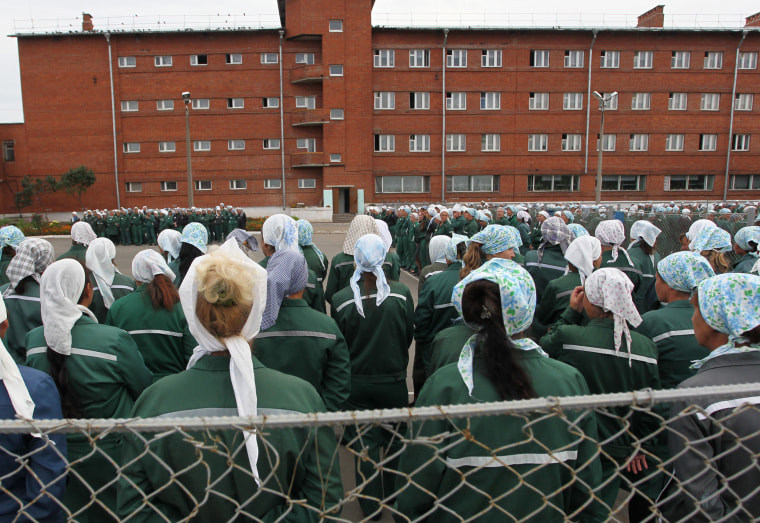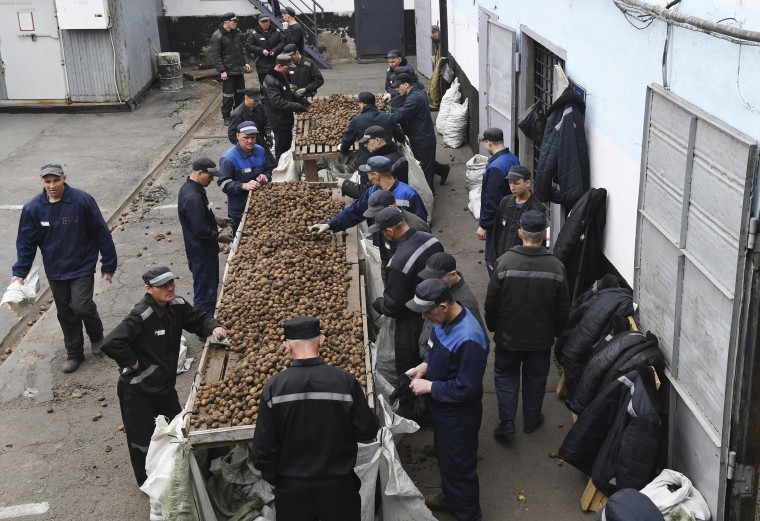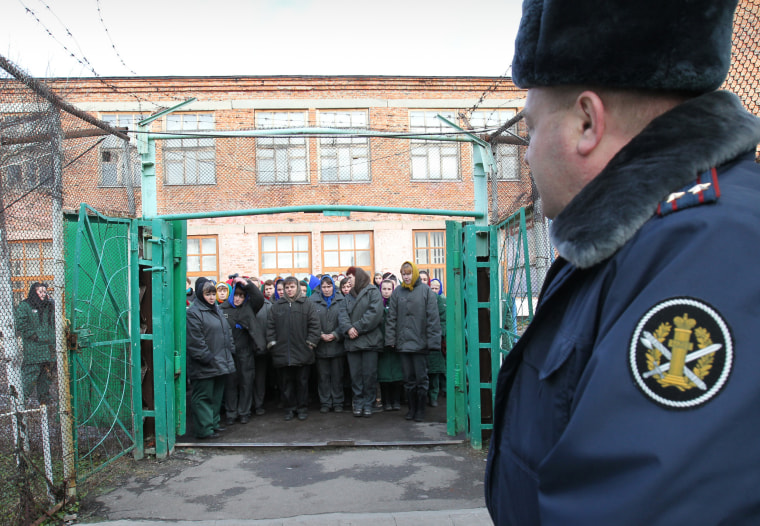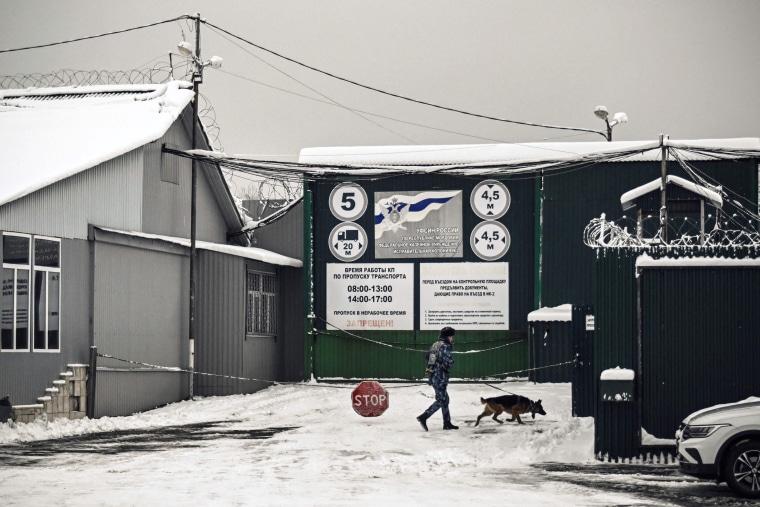Brittney Griner likely entered a system of isolation, grueling labor and psychological torment when she was transferred to a penal colony, the successor to the infamous Russian gulag, former prisoners and advocates said prior to her release in a prisoner swap Thursday.
Griner was transferred to a penal colony more than 200 miles east of Moscow last month, to begin a nine-year sentence handed down by a Moscow court in October.
She was free Thursday after a trade for arms dealer Viktor Bout.
Human rights violations are a regular feature of many of the camps, according to the U.S. State Department, human rights groups and others who have maintained regular contact with prisoners in Russia. That the WNBA star is a gay Black woman could have added unknown variables to a penal system that is known to be remote and harrowing.
“Conditions in prisons and detention centers varied but were often harsh and life threatening,” a 2021 State Department report on Russian human rights abuses said. “Overcrowding, abuse by guards and inmates, limited access to health care, food shortages, and inadequate sanitation were common in prisons, penal colonies, and other detention facilities.”
The report notes that “physical and sexual abuse by prison guards was systemic,” that torture of prisoners was pervasive — at times resulting in death or suicide — and that discriminatory protections against women and people of color were not often enforced. The law also does not prohibit discrimination based on sexual orientation.
“Russian prisons are grim, even relative to prisons in other countries. And the Putin regime has ramped up hostility towards gays and lesbians as part of its broader policy of hard-line nationalism,” said Muriel Atkin, a Russian history professor at George Washington University.
That would have added further concerns to a fraught situation. While tensions between the White House and the Kremlin continue to boil over the Russian invasion of Ukraine, Griner’s agent, Lindsay Colas, emphasized that she believed Moscow was using Griner’s imprisonment as leverage against the U.S.
“Brittney Griner’s nine-plus year sentence is regarded as harsh and extreme by Russian legal standards,” Colas said in a statement after her appeal was denied in October. “Today’s disappointing, yet unsurprising, appeal outcome further validates the fact that she is being held hostage and is being used as a political pawn. Brittney Griner is being held by Russia simply because she is an American.”
Penal colonies can vary but many are essentially repurposed Soviet gulags, a brutal system of labor camps and prisons that incarcerated millions of people from the 1920s to the 1950s. Prisoners were used for farming, mining or logging in sparsely populated areas of the country or worked in sweatshop conditions.
Typically such compounds are found in the far northern and eastern reaches of Russia as part of a unique system that aims to both imprison and exile convicts, according to an Amnesty International report published last year. It can often take weeks for prisoners to arrive at the prisons on prison trucks and specially designed train carriages called Stolypins.

Prisoners are extremely vulnerable and can be difficult to locate during the arduous journeys, Amnesty International noted. That has gained notice with the imprisonment of high-profile figures, such as oligarch Mikhail Khodorkovsky, Pussy Riot band member Nadezhda Tolokonnikova and opposition leader Aleksei Navalny, among others.
‘Treating incarcerated women like cattle’
Tolokonnikova provided some insight into a Russian prison camp in a letter to a Russian media outlet in 2013, a year into her sentence, in which she declared a hunger strike for the conditions she and others were forced to live in.
For those imprisoned alongside her in Penal Colony No. 14 in the Republic of Mordovia, she described working up to 17-hour days in a sewing shop, sleep deprivation, freezing conditions, a lack of basic hygiene, dangerous and humiliating working conditions, and regular assaults on other prisoners.
Tolokonnikova said that she was spared some of the abuse because of her celebrity but that she would continue her hunger strike “until the administration starts obeying the law and stops treating incarcerated women like cattle ejected from the realm of justice for the purpose of stoking the production of the sewing industry; until they start treating us like humans.”
The conditions do not seem to have changed since then.
Trevor Reed, a U.S. citizen and former Marine, spent nearly two years in a Russian penal colony also in Mordovia, about eight hours east of Moscow, until the Biden administration was able to negotiate his release.
Reed refused to work in the camps and was put in solitary confinement for months as a result, said Jonathan Franks, who consulted on the negotiations on behalf of the family, in comments prior to Griner's release. Reed lost over 40 pounds and became extremely sick, as he was not given adequate clothes to deal with the cold Russian winter and was fed substandard food like “spoiled meat that the prison cats wouldn’t even eat,” Franks said.
“The Russian hinterlands are pretty bleak,” he said. “The prisons barely feed the prisoners, so it’s often on the families to deliver most of the nutrition, and that has become increasingly difficult when it became impossible to engage in financial transactions in Russia.”

Anna Berbeneva fled Russia with her husband after he was arrested for protesting Russia’s first invasion of Ukraine in 2014. Now a member of the Voices of Russian Opposition in Sacramento in California, she corresponded with Russian prisoners for many years to give their cases greater attention.
She said the inmates would tell in their letters how administrators of the jails would use and abuse them.
“They can torture them, they can threaten them, they can blackmail them or do whatever they want. They’re like a toy to the jail administration,” Berbeneva said. “Nobody can protect them.”
Franks said he believed that, like Tolokonnikova, Griner may have been able to get greater protections than other prisoners because the Russians view her as valuable, although he added that “you can be psychologically traumatized and physically safe at the same time.”
Black, gay and female in a Russian penal colony
Rudra Sil, a Russian historian and political science professor at the University of Pennsylvania who was also speaking prior to Griner's release, said he was not exactly sure what life would be like for Griner at a penal colony. But if form and history held true, he said, it would undoubtedly have been brutal for her as a high-profile gay Black woman.
Kimberly St. Julian-Varnon, a doctoral student at the University of Pennsylvania who focuses on the Black experience in Russia, agreed. She noted that Russia would have been able to use much about Griner to make outlandish requests as the Kremlin preys upon America’s racial tensions and culture war issues.
“She’s Black. She’s gay. And this is a marijuana case,” Julian-Varnon told NPR. “What are the three biggest issues in the United States in terms of domestic politics? Marijuana convictions, LGBTQ issues, anti-Black racism — and the carceral system.”

Julian-Varnon said racism against Black people in Russia has heightened in recent years under Vladimir Putin, which did not bode well for Griner.
“The image of suffering, particularly African American suffering, became the controlling image of Blackness in Russia. ... In many ways, Russia has always used anti-Black racism and Black suffering for its own gain,” she said.
That image, Julian-Varnon said, may have played a part in the denial of Griner’s appeal and the possibility of nine years in prison. “What Brittney represents is new in terms of treatment of African Americans in Russia, because she no longer has the privilege that many African Americans had. African Americans were treated better than Africans in the Soviet Union. The Africans were seen as the little brothers who needed socialist education and needed the leadership of the Soviet Union to obtain modernity.”
But that has changed, Atkin said, along with some major gender issues. According to a report by Penal Reform International, an organization that supports criminal justice reform around the world, there are about 69,000 women in Russian prisons, and the conditions are hostile. “Russia has been undergoing a process of reform of the criminal justice system over the last 20 years, but there is still far too little consideration given to the promotion of gender equality and protection of the rights of women and girls in conflict with the law,” the report said.
Sil said Griner’s being a Black gay woman would have made it even harder to reach a diplomatic agreement or secure her release.
“Even in the best of times, it is not easy to simply get someone released in a foreign country, especially if there is a legal process getting underway,” he said. “Still, sometimes deals are cut and exchanges do take place.”


